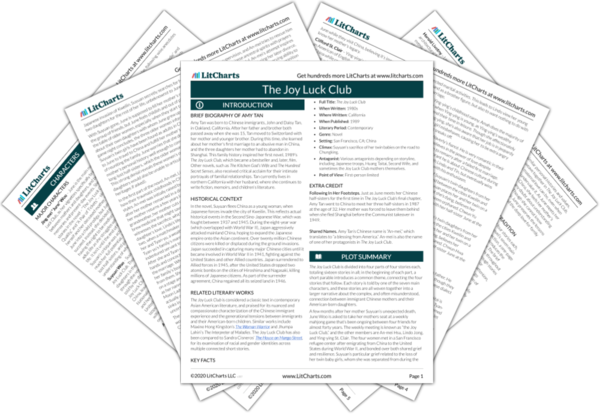Summary
Analysis
Lena comes from a biracial family: her father Clifford is American of English/Irish descent, and her mother Ying-ying is Chinese. Her parents met while Clifford was working in China, and when they relocated to America, he altered Ying-ying’s name and birthdate out of ignorance. Growing up, Lena is very aware of the large gaps in understanding between her father’s English and her mother’s Chinese, and she acts as the interpreter between them. Clifford constantly puts words into Ying-ying’s mouth when he isn’t sure what she’s saying, interpreting through his lens rather than trying to figure out what she actually means.
The immigrant mothers are often emotionally alienated by their loved ones, who don’t make the complete effort to understand them. Ying-ying is never fully heard or appreciated for her thoughts because of the language barrier, and her husband takes on the socially-accepted role of a man speaking for his wife.
Themes
While growing up, Lena sees her mother slowly turn into a ghost, first speaking in gestures and halted thoughts, and then eventually not speaking at all.
Since no one seems to care what Ying-ying really thinks, she withdraws into herself and becomes barely present.
Themes
Clifford receives a promotion that affords them a bigger place, and he claims Ying-ying “is thrilled.” The family moves to a nicer apartment complex in San Francisco, surrounded by tenants with European-sounding surnames. Ying-ying says in Chinese that the new apartment is full of negative omens, but Clifford doesn’t understand Chinese and Lena ignores her. At night, Lena hears Teresa Sorci, a neighbor girl about her age, argue loudly and violently with her mother. Lena imagines Teresa getting beat up every night, but never sees any physical damage on Teresa when they bump into each other in the hallway.
While Clifford values status as an American, Ying-ying values her superstitions; her values are ignored. Similarly, Clifford misinterprets what Ying-ying says, rendering her true emotions meaningless. Even when Lena hears her, Ying-ying’s warnings go unheeded. Unable to communicate, the immigrant mothers are made powerless. The vocal intensity of Teresa and her mother is in stark contrast to Lena and Ying-ying, who exist in silence.
Themes
Soon after the promotion, Clifford tells Lena that they’re expecting another baby. Though her father is overjoyed at the news, Lena hears Ying-ying predict that the apartment’s bad omens, felt around her as “a heaviness,” will negatively affect the health of her baby.
Ying-ying’s predictions continue to be ignored, at the cost of her unborn baby’s safety. Clifford’s enthusiasm shows how out of touch he is with his wife, stemming back to their cultural incongruity.
Themes
Get the entire The Joy Luck Club LitChart as a printable PDF.

Ying-ying’s premonition comes true, and the baby boy is stillborn, missing part of his brain. After the birth, Ying-ying is hysterical, confessing to Lena in Chinese that the baby’s death was due to bad decisions in Ying-ying’s past. Clifford, unable to understand, asks Lena to translate her mother’s rapid Chinese. Lena decides to purposely misinterpret Ying-ying’s fears to protect her father’s feelings, and tells him that Ying-ying is looking forward to trying for another baby.
Lena’s deliberate mistranslation of Ying-ying’s pain is the clearest example of language alienation in the novel. Ying-ying cannot be her authentic self, even in front of loved ones. Her despair is filtered through Lena’s attempt to protect her father, at the expense of Ying-ying herself.
Themes
Ying-ying is not the same after coming home from the hospital without her baby. She wanders around like a ghost, and retreats from social life, worrying Clifford and Lena. Lena tries to convince herself that her life is at least happier than Teresa Sorci’s, until one day, Teresa uses Lena’s fire escape to hide from her mother, Mrs. Sorci. Lena expects to hear the biggest fight yet when Teresa goes back home, but instead hears crying and laughing. Teresa and Mrs. Sorci are able to openly communicate and apologize in the same language.
Part of being a ghost in this novel involves being unheard. Ying-ying’s remaining spirit disappears as a consequence of Lena’s reinterpretation of her emotions. Though Lena wants to believe her relationship with her mother is fine in comparison to a different kind of extreme parental style, she realizes that communication is vital to healthy relationships.
Themes












